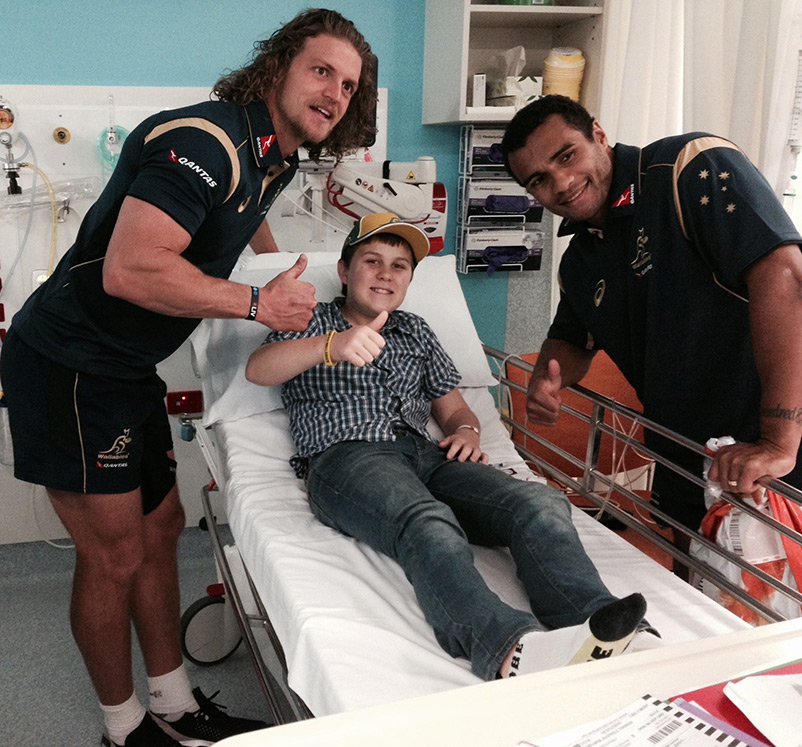
Max was like any active, sport loving kid who enjoyed playing soccer and rugby. This was something he loved doing with his brother. Playing sport, which was second nature to him, would soon become something he would have to relearn to do.
In 2012, at the young age of eight, Max started having extreme headaches, which became more and more frequent. As they were something that would come and go, it was easy for Max and his family to go to the usual remedies such as laying down, waiting for them to pass, general medication or trying to distract him.
Two years later, the pain from a headache became so intense that Max’s parents took him to the Mater Children’s Hospital Emergency Department, where he had a CAT scan.
After the CAT scan came the news that no family wants to hear.
“The scan detected five tumours in my brain. One was the size of a golf ball, and another was the size of an egg,” Max said.
That night Max had a drain put in his brain to relieve the hydrocephalus (a build-up of fluid in the cavities deep within the brain) which removed pressure from his brain.
Max then underwent an eight-hour dual craniotomy, to remove the tumours from his brain, followed by time in the Paediatric Intensive Care Unit, and high-dependency unit.
“Everything from that point on was hard,” Max said. “I had to learn how to read and write again, how to walk and talk as well. I also started 12 months of chemotherapy at the Queensland Children’s Hospital (QCH) as an inpatient initially and then continued as an outpatient, visiting the hospital monthly for chemotherapy.”
Due to the rarity of the tumours, samples were sent to the United Kingdom and the United States to determine his diagnosis, which was ganglioglioma, a rare type of brain cancer.
In 2015, Max finished his chemotherapy, and his doctors delivered the news that his tumours had turned benign.
Although, his tumours were pronounced benign, Max still had a road to recovery ahead of him. This included visiting the QCH to get help with the side effects of the cancer treatment, and to learn techniques that would help him at school.
Now, 20 years old, his tumours remain benign but Max still deals with the side effects every day, including 50% loss of vision and long-term cognitive fatigue.
“Having fatigue is challenging, because I feel every time I learn something new, I have to learn it twice,” Max said.
“My visual impairment is also tricky to deal with because it takes me much longer to complete tasks, because I don’t want to miss anything, and this tends to add to my fatigue.”
“It was challenging to deal with these side effects, but I was able to get through it thanks to the support from my doctors, and my parents were also such an important and amazing support system for me,” he said.
Max is now in his second year of university completing a Bachelor of Arts, majoring in Philosophy.
“I always dreamed of going to Uni ever since I was diagnosed with brain cancer, and to actually be doing it is just insane. At one stage it was something I thought might not even be possible,” Max said.
He also volunteers at the Children’s Hospital Foundation, working in the Community and Partnership team.
“My favourite part of volunteering is going to fundraising events because I see a lot of the people I’ve met through my hospital journey,” he said.
When he’s not working or studying, Max loves running and playing piano.
Max is the official Children’s Hospital Foundation ambassador for the Bridge to Brisbane fun run, running his first ever 10km race in 2015 after pushing back his last session of chemotherapy.
“As hard as it was to train while undergoing chemo, it wasn’t as intense as my surgeries, and I knew there were kids who were going through what I had been through and I wanted to do whatever I could to help, because I knew how hard life in hospital can be,” Max said.
“I still run to this day, and I love it because I can zone out and just let my body carry me for as long as I want. I feel like it is my time to truly not worry about anything because I’m in my own world.”
“I initially did it to raise money to help other kids with cancer and for kids who can’t leave their beds, because I know how challenging it can be living in hospital.”
“Looking back at what I’ve been through it really helps me to realise now, how incredible everything in life truly is,” Max said.